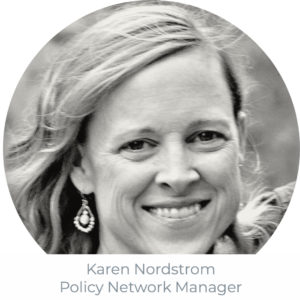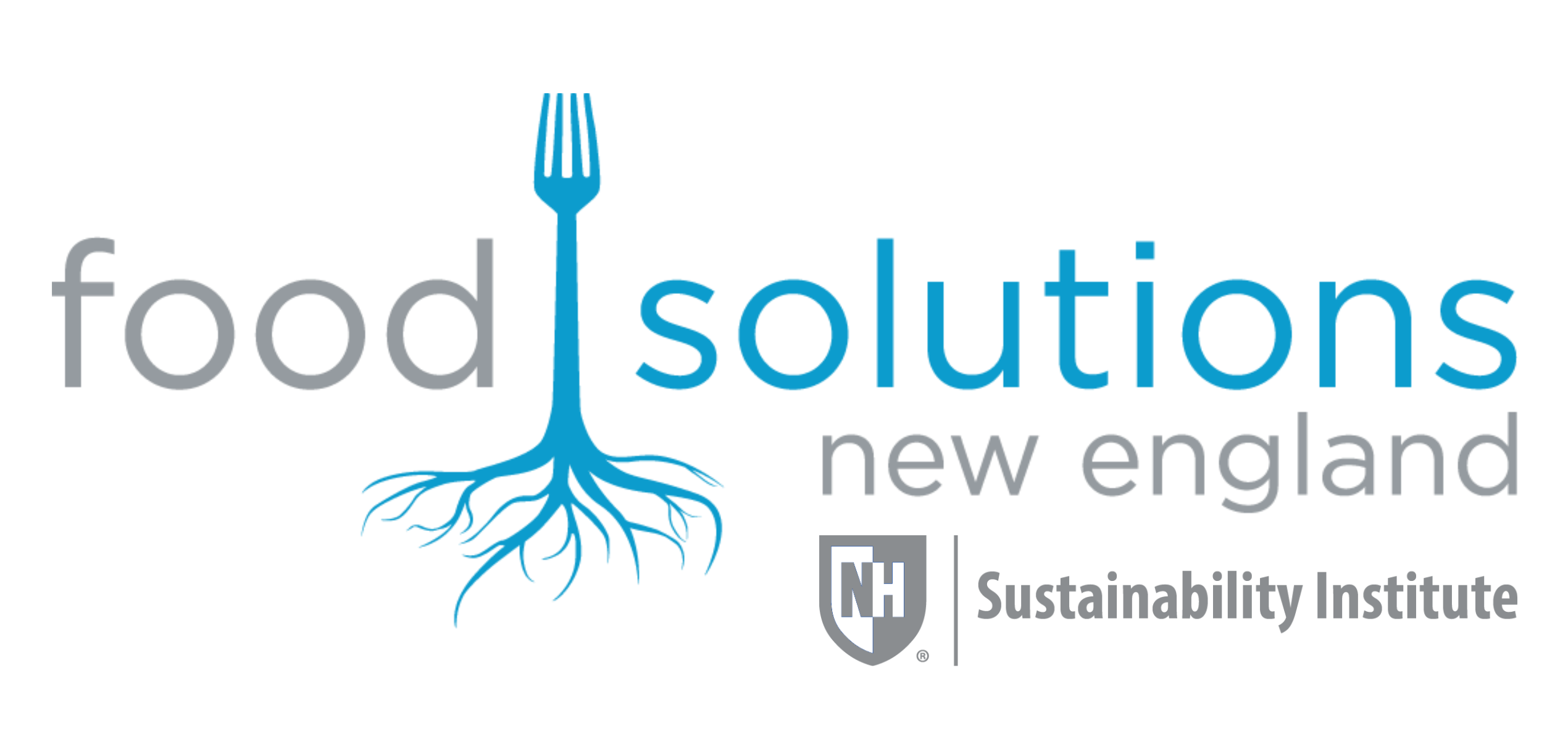
Across New England, Dockets Center Policy Priorities
 Greetings and welcome to the Spring 2022 FSNE policy update!
Greetings and welcome to the Spring 2022 FSNE policy update!
Within the region, state legislative sessions are either in full swing or winding down, providing us with innumerable examples of visionary policy activity that aligns with our collective work to achieve the New England Food Vision. These efforts remain diligently aligned with the core FSNE network values of democratic empowerment, racial equity and dignity for all, sustainability, and trust.
Throughout the session, increasing attention has been placed on the next Farm Bill, scheduled to be signed into law in 2023, and viewed to be a core driver of change as we aspire to achieve our region’s goals for food systems transformation. In this update, we highlight these priorities at federal and state levels of scale, offering examples, plus content from relevant reports, that uplift the intersectional environmental conservation and social equity initiatives being supported by agencies and organizations working tirelessly to advocate for sustainability and resiliency within the region.
With each subsequent policy update, we will highlight a key issue for the region, with this update focused on multifaceted efforts in Maine to balance solar development with land use plans while reducing the negative impacts of climate change. We elevate current legislative activity by state, lifting up the work of regional partners directly engaged in political advocacy, and link to Bill Trackers in the states of Massachusetts, New Hampshire, and Rhode Island. To close, we begin to explore the structure, function, and activity of municipal food policy councils. For this closing segment, we highlight the Massachusetts Food System Collaborative’s Municipal Food Policy Project and related Food Policy Council Network.
Federal
The National Association of State Departments of Agriculture (NASDA) released Policy Statements and a Press Release on 10 specific Farm Bill Priorities. The group’s 10 priority policy areas include Agricultural Research, Animal Disease, Conservation, and Climate Resiliency, Cyber-Security, Food Safety, Hemp, Invasive Species, Local Food, Specialty Crop Block Grants, and Trade Promotion.
The Environmental Protection Agency (EPA) Released its Equity Action Plan Alongside Federal Partners. The Equity Action Plan aligns with the Agency’s Fiscal Year 2022-2026 EPA Strategic Plan (overview here), announced on March 28, 2022. The strategic plan includes an unprecedented strategic goal to advance environmental justice and civil rights.
Key Issue: Solar Siting
Maine’s climate action plan from the Maine Climate Council recognizes the value that both agricultural production and expanded renewable energy generation play in reducing greenhouse gas emissions, and suggests a thorough examination of land-use decisions.
The Maine Governor’s Energy Office released its Agricultural Solar Stakeholder Group Report on January 20, 2022. The Stakeholder Group, convened by the Department of Agriculture, Conservation and Forestry and the Governor’s Energy Office, was created by LD 820 (Resolve, To Convene a Working Group to Develop Plans To Protect Maine’s Agricultural Lands When Siting Solar Arrays). It focused on the intersection of solar development and agricultural lands, providing information and resources to inform practitioners and decision-makers on the ground. The Stakeholder Group made seven consensus recommendations to the DACF and the Governor’s Energy Office:
- Creation of a centralized clearinghouse of information
- Dual-use pilot program
- Consideration of current use taxation
- Consideration of standards for dual-use and co-location in permit-by-rule review
- Development of hosting capacity maps
- Increased support for municipal planning capacity
- Consideration of program preference based on agricultural site characteristics
The Agricultural Resource Development Division of DACF provides Agricultural Solar Siting Resources for those interested in learning about the intersection of agriculture and solar energy, and Maine Farmland Trust supports balanced solar development, recommends six solar siting guidelines, and advocates for LD 856, An Act to Balance Renewable Energy Development with Natural and Working Lands Conservation.
States
Connecticut
The Connecticut Land Conservation Council (CLCC) annually adopts a set of state legislative priorities to present to the CT General Assembly and federal priorities to pursue in Washington, D.C. CLCC’s 2022 State Policy and Funding Priorities center financial incentives for land conservation, stewardship, and climate resilience.
The Working Lands Alliance also adopted 2022 Policy Priorities. These policy priorities include: Maintaining and supporting funding for farmland protection, Strengthening the CT Dept of Agriculture’s Farmland Preservation Program, Supporting working lands component in any and all climate change legislation, and supporting policy priorities developed by CT Dept of Agriculture’s Farmland Access Working Group, Supporting policies that increase the agricultural viability of farmers and promote food security, Supporting the design and implementation of an urban agriculture unit with the CT Dept of Agriculture, and Supporting Provisions that promote smart solar siting planning and placement of large-scale arrays (including disincentive solar arrays on prime and important farmland and core forest).
Bill No. 243 (February Session 2022) An Act Concerning Climate-Smart Agricultural Practices centers on farm nutrient management planning and complies with a farm resources management plan or a farmland restoration plan (a conservation plan of the USDA’s NRCS of a soil and water conservation district), which the bill renames the farmland restoration and climate resiliency plan. The bill broadens the term “agricultural restoration purposes” to incorporate climate-smart agriculture and forestry practices, including practices in urban areas, soil health and water source improvements, woodlot management, and farm equipment purchases intended to improve soil health.
The bill authorizes the agricultural commissioner to provide grants that prioritize capital improvements made under the plan and pay or reimburse certain entities (i.e., a municipality, nonprofit organization, soil, and water conservation district, or UConn Extension Services) for a variety of services designed to increase implementation of climate-smart agriculture and forestry practices. These practices include carbon storage, improved soil health, reduced GHGs through the use of cover crops, prescribed grazing, nutrient management, and manure management. Services payable or reimbursable include technical assistance, training, and equipment sharing programs, pilot or demonstration projects, the creation of tools that reduce barriers to conservation practices, and other activities that increase the implementation of climate-smart agriculture and forestry practices. The law also authorizes the agriculture commissioner to establish this program to encourage the use of vacant state property for gardening, agricultural purposes, or agricultural restoration purposes.
Maine
Per- and polyfluoroalkyl substances (PFAS) are manmade chemicals known to cause multiple health issues. These substances have ended up in Maine’s land and water through the sanctioned spreading of contaminated municipal waste and paper mill sludge on farmland. Maine farmers who have learned that their water, soil, and some food that they produce are contaminated to varying degrees need access to financial and healthcare resources–and possibly relocation if land is too contaminated to continue farming. State and federal support are needed to meet these and additional research and remediation needs.
Maine Farmland Trust (MFT) is working to protect farms and farmland from PFAS. MFT supports an amendment to LD 1911, “An Act To Prohibit the Contamination of Clean Soils with So-called Forever Chemicals,” that would ban the land application of PFAS-contaminated sludge and compost derived from sludge, and prohibit the sale of compost derived from sludge in Maine. MFT and Maine Organic Farmers and Gardeners Association are jointly administering a PFAS emergency relief fund to support any farm dealing with potential per- and polyfluoroalkyl substances (PFAS) contamination.
Maine Ambassador, Senator Craig Hickman, Senator Hickman celebrates 50 million investment in affordable housing
Massachusetts
Visit the Massachusetts Food System Collaborative’s Projects page to learn about current legislative activity. The following is the list of bills that align with the 2015 Massachusetts Local Food Action Plan and the 2020 Perspectives on Resilience and Recovery report:
S.539/H.858 – An Act regarding a farmland protection and viability action plan
S.108/H.250 – An Act relative to an agricultural healthy incentives initiative
S.502/H.860 – An Act promoting equity in agriculture
H.884 – An Act supporting the Commonwealth’s food system
S.1822 – An Act supporting the Commonwealth’s farmers
S.954/H.1702 – An Act encouraging the donation of food to persons in need
S.1441/H.3926 – An Act relative to in-state meat inspection programs, An Act to support infrastructure needs for livestock farmers
This Projects page also documents submitted testimony on session items. The most recent documents include FY23 and ARPA II budget requests (3/1/22) and FY23 Capital Budget requests (3/21/22).
New Hampshire
The New Hampshire Food Alliance provides a list of bills in each committee. Bills from the Senate Energy and Natural Resources Committee, the Senate Health and Human Services Committee, and the House Education Committee include:
SB 369 An Act relative to organic farming.
SB 267 An Act establishing the upland invasive species program, program fund, and program coordinator in the department of agriculture, markets, and food.
SB404 An Act establishing a supplemental nutrition assistance program.
SB403 An Act re-establishing the Special Supplemental Nutrition Program for Women, Infants, and Children (WIC) Farmers Market Nutrition Program.
HB 16657 An Act establishing a New Hampshire farm-to-school reimbursement program.
HB 1561 An Act relative to school nutrition standards.
HB1058 An Act relative to the time allowed for public school students to eat lunch.
HB1564 An Act requiring school districts to provide breakfast for students.
Rhode Island
The Northeast Organic Farming Association of Rhode Island (NOFA-RI) endorses S2299– An Act to restrict the use of neonicotinoids, which are a class of insecticides. Neonicotinoids are highly toxic to songbirds, bees and other pollinators, and aquatic life. They remain in the tissues of treated plants, showing up in pollen and nectar. They are also persistent in the environment, contaminating waterways. The act would protect Rhode Island pollinators by restricting the outdoor use of neonicotinoids to certified applicators under limited conditions. In New England, Maine, Massachusetts, Vermont, and Connecticut have all looked at the evidence and passed similar regulations. On Wednesday, April 6, the Senate Environment and Agriculture Committee heard testimony on S2299. The committee recommended that the measure be held for further study.
Rhode Island Food Policy Council now offers live bill tracking on their policy webpage. Their nonpartisan ‘Food Policy Bill Tracker’ serves as a reference for legislative initiatives in the state and is regularly updated during the legislative session. Bills are sorted into the following categories: Access to Healthy Food, Agriculture, Climate Change, Environmental Protection, Equity and Justice, Fisheries and Aquaculture, Food Businesses, Food Safety, Miscellaneous, Recycling, Recovery and Wasted Food, and Rescue RI Legislation. In addition to an assortment of bills that address access to healthy food through nutrition education, free school meals and SNAP incentives, these bills address issues that range from housing construction and plastic waste reduction to zoning ordinances and licensing for small businesses and commercial fishing vehicles. Acts relating to State Affairs And Government address the topics of environmental justice and establishing baseline shellfish harvest and restoration targets. Under Miscellaneous, currently listed is a bill that would prohibit the production, sale, or importation into Rhode Island of any force-fed poultry product, or food containing a force-fed poultry product.
Vermont
Recent legislative advocacy in Vermont has received support from Rural Vermont, NOFA-VT, Vermont Audubon, and the Vermont Growers Organization.
Rural Vermont released its Policy Priorities 2022 and recently posted an action alert in support of H501, An Act relating to the regulation of food depackaging facilities. The bill would apply a precautionary approach to how food residuals are being managed in Vermont, for clean waste streams and to avoid contaminants like microplastics in soils and waterways.
NOFA-VT joined Rural Vermont in its call for farmers to provide input on H.466, An Act relating to surface water withdrawals and interbasin transfers, which was developed without input from fruit and vegetable growers, the group most affected by the proposed legislation. NOFA-VT asks them to vote “No,” to remand the bill to the Senate Agriculture Committee, which would allow for revisions before final passage.
In February, NOFA-VT, Rural Vermont, and Vermont Audubon called on constituents to contact their legislators in support of H.626 to prohibit the use of harmful neonicotinoids, a class of pesticides that has become increasingly popular as a means of protecting crops against insects. Vermont Audubon cites the evidence confirming the negative effects of neonics on birds. These effects include behavioral and physiological effects including malformations in chick embryos, diminished food sources from the loss of aquatic macroinvertebrates, and direct mortality from eating neonic-coated seeds.
The Vermont Growers Organization supports bill H273, the VT BIPOC-led land access, and opportunity act. Seeding Power Vermont will send progress updates re: H.273. (To receive these updates, sign up here.)
Municipal
The Massachusetts Food System Collaborative recognizes the capacity of municipal food policy to leverage significant change in local food systems that fall under municipal jurisdiction. Local officials lobby to change local laws, regulations, programs, and investments to make the local food system more sustainable and equitable at the municipal level. The site lists collaborative projects, along with supporting publications and resources from other organizations. The Food policy council network builds a coalition of agencies and organizations, including nonprofits, municipalities, hospitals, and grassroots organizations, to amplify advocacy efforts to improve local food systems in the state. They meet quarterly to build relationships, to learn from one another, and they provide legislative updates and skills-building workshops focused on effective advocacy.
We offer this and subsequent policy updates in order to share information resources, strategies, and tactics, and to inspire one another to remain committed to visionary policy within the region. If you have questions or comments, or would like to connect further around any of these topics, please feel free to reach out directly to FSNE Policy Network Manager, Karen Nordstrom (karen.nordstrom@unh.edu).




